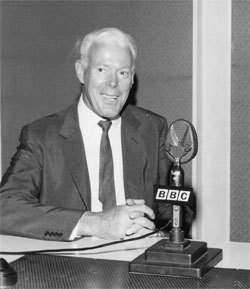AWARD 16 March 1987
Trevor Leggett was head of the Japanese Department of the BBC.

This is one of his broadcasts to Japan
Zubari for 16 March 1987
On March 17 in Tokyo, Trevor Leggett, former head of the Japanese Service, and still a regular guest speaker with his programme called Zubari Hodan, receives a Bukkyo Dendo Bunka-Sho award from the Bukkyo Dendo Kyokai. This was for his services in helping to spread knowledge of Buddhism by six books of translations of Japanese Buddhist texts, and also his own writings. Here is a recording made by Mr. Leggett about his own feelings on the award:)
When I returned to Britain after the war, I had the opportunity to become head of the Japanese Service, in which I was able to transmit to Japan not only news but also something of British thinking and feeling. I accepted this offer with joy, because I thought I could then do something to dispel the atmosphere of mutual hatred caused inevitably by a great war.
But, at the same time, I wanted to do something in the reverse direction, and bring some of the fruits of Japanese genius to the West. One of these was Buddhism, and in 1946 I began the series of translations to which I have devoted a good deal of my spare time for forty years. I did not want to avoid any particular areas of life, and the first piece I offered to a publisher was a translation of the Maxims of Takamori Saigo, which is full of Zen Buddhist ideas. The publisher said: ‘I doubt whether this will be liked, so soon after the war with Japan.’ But, in fact, there were favourable comments, and I found that translations of Japanese Buddhist texts were in fact much appreciated by British and also American readers.
Another aspect of Japanese culture which I believed would have great value for the West was Judo, at which I hold a Kodokan Rokudan diploma. I founded a 100-tatami dojo in North London, and taught many young people there. At the end of the practice, we used to have the traditional ‘Mokuso’ for ten minutes. This is an extremely effective way of practising meditation, because the sweat is running down one’s body, and perhaps there are a few bruises. British people took to this practice, and some who have now retired from active practice, have told me that they still do the ten minutes Mokuso every morning. They say it is like a mental bath.
In the children’s classes, we used to limit the Mokuso to only five minutes – which is a very long time to an eight-year old child. When we had a new class of children, they were quite surprised, at the end of the Judo, to be told to sit quite still in Seiza, and quieten the mind. ‘Keep quite still, quite still,’ we told them, and they would sit in a long line, like little dolls. Then one of us seniors would knock over a chair, and most of the little faces would turn to see what had happened. The teacher would roar: ‘STILL! DON’T MOVE YOUR HEAD!’
Then after another minute, a senior would splutter: ‘Oh, oh! Look out!’ and fall heavily to the ground. A few of the little heads would half-turn to look, then jerk back at the shout from the teacher: ‘STILL!’
At the third disturbance, most of them could keep sitting rigidly; they were very proud of their self-control!
I remember that we had a letter from a school teacher addressed to the Judo club, saying: ‘I do not know what disciplines you use in your Judo classes, but I want to thank you for the changes in little Tommy and Jacky. Their attitude towards their teachers has been transformed since they began Judo.
One of the glories of Buddhism in Japan is, that it has influenced so many of the other parts of life, and this was a striking example. Such things have given me the feeling that my labours to spread Buddhist ideas has been to some extent fruitful.
Anyway, it is a great honour to receive this award from the Bukkyo Dendo Kyokai.
© Trevor Leggett